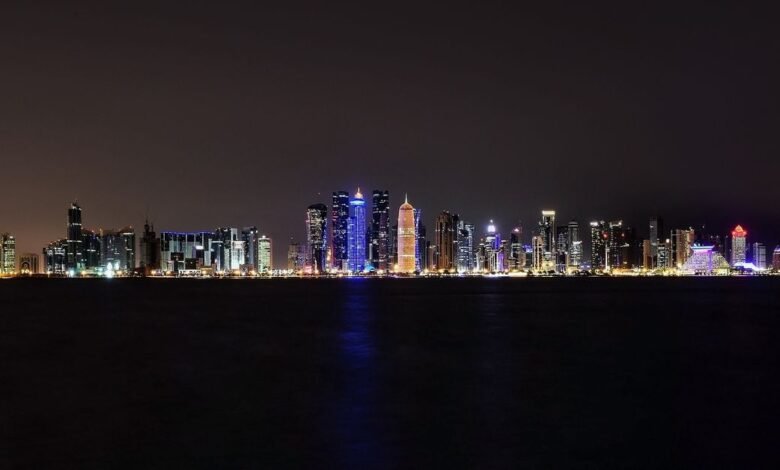Qatar’s Sovereign Fund Might Be Buying Bitcoin, But Surely Not $500B Worth

-
Bitcoin maximalists like Max Keiser have spread rumors of a $500 billion BTC purchase by Qatar, which would be larger than the sovereign fund’s current holdings.
-
The Qatar Investment Authority has denied investing. But, with BTC increasingly accepted on Wall Street, sovereign funds may add digital assets to their portfolios soon.
In recent days, rumors have resurfaced surrounding Qatar’s sovereign wealth fund making a major investment into Bitcoin.
During the cryptocurrency’s ride up to an all time high of $69,000, analysts noticed a new wallet holding more than 50,000 BTC (over $3.3 billion). Referred to as “Mr 100” due to multiple daily purchases of 100 BTC over several weeks, many have wondered if this could be the nation looking to diversify its sovereign wealth fund’s portfolio, a secret billionaire or a bank accumulating BTC ahead of launching an ETF.
The $500b tweet
Speculation began in December 2023, following a tweet by Bitcoin maximalist Max Keiser, suggesting that the QIA (Qatar Investment Authority) could make a $500bn investment into Bitcoin.
Keiser, known for his work on El Salvador’s Bitcoin strategy, hinted at a seismic market impact. This claim stirred a frenzy across social media, helping push BTC higher.
“I have 1 word for you $100,000 Bitcoin God Candle fans. QATAR, the rumors are getting very loud on this. Their [sovereign wealth fund is] looking to buy ½ trillion BTC,” (sic), Keiser said on X.
Just days ago, Anthony Scaramucci added fuel to the fire by replying to Keiser’s most recent tweet, saying “It’s happening!!!”.
The Skybridge Capital founder, who recently predicted Bitcoin will reach at least $170,000 post halving next month, wrote on X: “Max is saying Qatar may have added BTC to its balance sheet. If true all we can say is thank you Max Keiser!”.
Evidence for the claim is circumstantial: the Qatar Executive Gulfstream G650ER, the private jet of The Emir of Qatar, was spotted flying into the Bitcoin Atlantis conference in Madeira at the start of the month.
Amid the speculation, experts argue that government-level investments in Bitcoin are becoming increasingly plausible. CoinDesk contacted the QIA for comment. While representatives at QIA remain tight-lipped about specific investment moves, they reaffirmed a focus on blockchain technology over direct cryptocurrency investments.
Speaking to CoinDesk, Talal Tabbaa, CEO of CoinMENA, the first regional cryptocurrency exchange to enter the Qatari market, highlighted a shifting landscape where even sovereign states might view Bitcoin as a viable component of their financial strategy.
“With BlackRock acquiring over 200,000 Bitcoin in the past six weeks, it’s perfectly normal for any government to consider allocating a serious amount of money to bitcoin,” he said.
A closer look at the numbers
The initial rumored investment of $500 billion is bigger than the QIA’s reported institutional holdings of $475 billion assets under management (AUM), making the investment unlikely.
For comparison, MicroStrategy holds an estimated 205,000 BTC, worth an estimated $14 billion at current prices. It has acquired this amount slowly over several years. A $500 billion purchase, as rumored by Keiser, would be logistically difficult, as every purchase requires a seller.
Obvious questions arise regarding the prospect of even being able to acquire what amounts to about 40% of Bitcoin’s current total market cap. The world’s largest wallet, owned by world’s largest crypto exchange, Binance, holds only about $14 billion worth of BTC.
Yet, as Tabbaa says,it is impossible to rely on speculated dollar numbers as a gauge for potential Bitcoin investment or not, adding that there is ‘‘no way to sense, check or validate them.’’
CEO of the QIA, Mansoor bin Ebrahim Al-Mahmoud, previously stated in 2022 that the fund has no interest in cryptocurrency investments. However, Tabbaa warns against viewing regulatory caution as a blanket stance against all forms of digital asset investments, suggesting a potential distinction between public regulatory positions and private investment strategies.
“Financial regulators aim to protect investors, while investment funds, whether sovereign or non-sovereign, are looking for return and it would make sense to buy Bitcoin in that case,” Tabbaa said.
Qatar’s crypto regulatory landscape
Cryptocurrency has not been legalized in Qatar. The Central Bank of Qatar has made trading Bitcoin illegal due to its volatility and alleged potential for financial crime and lack of underlying assets. Officials cite the need to safeguard the financial system and ensure economic stability.
Qatar is laying the groundwork for a sophisticated regulatory framework dedicated to digital assets, with a focus on investment tokens that are tied to tangible underlying assets. Notably absent from this framework are stablecoins, CBDCs and other forms of cryptocurrency.
Tabbaa said that despite the cautious regulatory approach from Qatar, the MENA region, led by the UAE and Bahrain, has made progressive steps to position itself as a “global crypto hub,” with Dubai’s Virtual Assets Regulatory Authority (VARA), being the world’s first independent crypto regulator and Abu Dhabi driving bitcoin mining for the region.
“The U.S. took arguably the biggest step with ETFs, but I am super optimistic on digital asset growth in the region,” Tabbaa said.
Separating fact from fiction
Qatar’s rumored Bitcoin investment underscores the crypto world’s susceptibility to speculative chatter. Qatar’s regulatory stance and the country’s recent financial commitments suggest that a $500 billion investment in Bitcoin in the short term is unlikely and feasibly impossible.
Nevertheless, many are left pondering the identity of “Mr 100” and if there is any truth to the speculation. Are the rumors based on nothing but hearsay and fantasy? Or do they show Qatar moving in a direction of embracing crypto assets more strongly?
Source link





